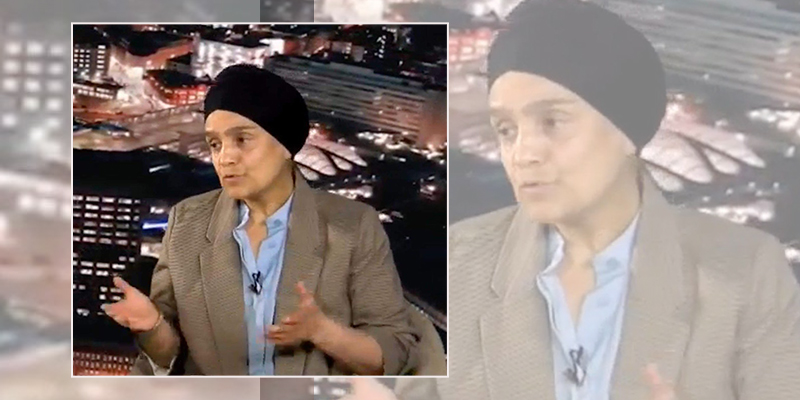
By Manjit Kaur | Opinion |
In this article, I reflect on how I developed an interest in and inspiration for media and how, against all the odds, I was able to become a TV presenter. My story is one of a Sikh female and her struggle against deep rooted gender stereotypes within first-generation Sikh families that settled in the UK during the 1960s. From my birth in 1962 to my early 20s, like many other Punjabi Sikh girls of my generation, my life was very much structured around limited expectations. Though things have changed now, looking back, in some senses, it does feel to me that I managed nothing short of achieving the impossible!
Like most other Punjabi Sikh girls of my generation, growing up in the UK in the 1960s was a mix of life mostly revolving around school during the week and participating in family and community events during the weekend. And because I grew up in a very religious family, I can recall many Gursikhs coming to our house for kirtan programmes and Akhand Paths. Like any other typical family, there was conflict at home and plenty of sibling rivalry and it didn’t help that I was the youngest!
Life at home was very different from school, meaning that I grew up navigating between cultures. Along with Punjabi girls, I also had black friends, though I was never able to allow those friendships to infringe on my home and work life, which was in the family business. To be honest, I was living a double life, which resulted in lots of code-switching. At school, I would mostly speak English and interact with people from a wide variety of cultures, but at home, it felt like another world. Though I spoke in English with my siblings, Punjabi language, Punjabi food, and Punjabi dress were the norm, which included having to keep my head covered at all times!
I did value the close-knit structure at home, which made me feel secure and ‘looked after’. However, as I began to develop my thoughts about who and what I was and wanted to be, I also felt home life was restrictive and controlling. Though no two Punjabi families are alike, I do think my experience of ‘care’ and ‘control’ is something that many girls like me will have experienced.
Culture and tradition had a powerful effect on our lives, and though I now have a completely different view of the role of girls in Punjabi Sikh families seemed normal. The expectations of boys/men as the wage earners and girls/women being responsible for the domestic sphere, to cook, clean, and serve, seemed ‘natural’ at the time. However, I can remember questioning and resisting the control that was being imposed on me, though this didn’t lead to any significant change at the time.
When I got married, there was some change and I able to exercise more control over my life. However, the gender role expectations didn’t disappear altogether, and in some sense my struggle has been ongoing. Let me explain. Most people are taught that gender is fixed, and that human nature determines what roles women and men can adopt. However, as we have seen in the past 30 years, many of those traditional stereotypes have been shattered, and we can see women and girls doing many roles that once were considered for men, and vice versa. We see men in caring, catering, and cleaning roles, which were once considered the responsibility of females.
Another dimension of the shaping of gender roles, particularly within the Punjabi feudal culture that I was subject to from birth, was that girls are a form of property which is to be nurtured and eventually passed onto her future in-laws after marriage. At the time, I was ignorant about this. Still, on reflection, I now realize that, though I was loved and cared for, as a girl child I was also seen as a burden, and the ultimate responsibility for my parents was to make sure I could be successfully married off. Then I would be the responsibility of my husband and in-laws, and the cycle would continue with the birth of my children. I am pleased to say that I was able to break the cycle in my family and raise my children to develop their own minds and life choices. I am pleased to say that in rejecting feudal traditions, far from losing my ‘izzat’ or ‘self-respect’, I believe my children have brought great honour to me and my family.
Some might be thinking, what does this exploration of my upbringing and gender attitudes have to do with me and my journey into the media? Put quite simply, in all honesty, for the first 40 years of my life, if anybody had even suggested that I might one day be doing live TV and writing columns on a wide range of difficult subjects (e.g. family violence, abuse, racism, fake godmen, etc.) that the Punjab Sikh community traditionally chooses to bury, ignore, or deny, I would have said they were making fun of me!
As I reflect on my life and try to understand how I have almost managed to achieve the impossible, I think I can identify several factors. Some of these relate to my personality and inner instinct to struggle, which I feel I always had; others relate to specific moments in my life that on reflection I can now say were transformative. But perhaps the biggest challenge for me has been to overcome what is known as ‘imposter syndrome’, which affects many people, especially women such as me, who enter spaces that were traditionally seen to be for white males. Put very simply, imposter syndrome is the belief that you are less capable than those around you, that your success is the result of luck or other external factors and that you will be discovered as a fraudster.
One of the effects of imposter syndrome is to feel a sense of threat. Research suggests that humans respond to threats in three ways: fight, flight or freeze. From a young age, I identified as a fighter, earning me the label of ‘the difficult one’ from my father. Others, too, have commented on my determination and courage to stand up for myself. Indeed, I know that for some women, my refusal to be a ‘good girl’, i.e. to be a passive victim, has been troubling. Why, because when you have experienced oppression for so many years, I accept it can be and emotionally threatening to face up to reality. Though I am a fighter, this does not mean I don’t experience the other emotions as well. Indeed, especially when I entered the media space, I can remember occasions when, during a live show, feeling fear and a real sense of wanting to get up and leave. Thankfully, over the years, I managed to cope with my emotions and use them in a positive way.
Things have now changed, but my time few girls were allowed to leave home and go off to university, which meant I left school at 16 and worked as a supervisor and trainer in my dad’s factory. Around this time in my life I was went to live in Punjab for 6 months in my parents’ house in Jallandhar City, during which I was able to reconnect with my Punjabi roots. One of the important developments, which would later play an important role in building my confidence to go into media, was that I had learnt to speak and write Punjabi confidently. I am often asked, given I am British born and bred, how have I managed to speak such fluent Punjab? and this experience was one of the main reasons. To this day, I am very proud of my roots and a love my Punjabi mother tongue.
Though I did eventually manage to go to college after my marriage, if I am honest, I still do have a slight imposter syndrome when it comes to interacting with highly educated people. I guess those psychological scars from my early life, of feeling inadequate, will never disappear, though I have now learned to not let this hold me back in my ambition.
My first transformative moment was around the age of 26. I had been married now for around 3 years, and most of my time was taken up with caring for my two children, who were born one year apart. However, I had always expressed a desire to restart my education, though my confidence levels were very low. Anyhow, my partner was very encouraging, and I began to attend workshops on personal and self-development, which were fantastic as they enabled me to learn and interact with and from others who had similar experiences and aspirations. Indeed, my desire to learn and develop my creative side was such that I also enrolled onto courses in fashion, life drawing, painting and sculpture.
With these experiences, I was discovering all kinds of hidden talents, but it was in the field of counselling that I really discovered my true interest was in people and society. It was on one such course, where I had to do a live role-play counselling another person to enable them to speak about their problems. What made it even more nerve-racking was that the interview was being recorded on camera be reviewed by the whole class afterwards. I was terrified! To my surprise, I managed to do the exercise and got really good feedback from the tutors and fellow students. However, I still doubted my performance and felt the students and tutor were just trying to be kind; I could not even believe the person on the video was me!
I now realize these were the effects of suffering from imposter syndrome, which can affect you in many ways. For me, there were two fears I remember most of all; one was the fear of failure and the second was that everybody else was so much better than me, which wasn’t true! As I have developed, I have come to accept that many such fears that we have about ourselves are irrational, but they come from somewhere. And for me, it was those childhood experiences where gender stereotypes meant that as well as being held back from my education, I had few role models.
This leads me to another transformative moment, which was more like a period in my life. This is where I began to read and learn about the struggles of black women and two in particular. The first was African American writer, Audre Lorde who, like me, had grown-up in a traditional and strict family. She had a mixed relationship with both her parents from a young age, who, were busy running their family business, and hence had very little time for her. From struggling at school, Audre Lorde became a great scholar and feminist activist, and it was one of her many quotes from an article she wrote called The Transformation of Silence into Language and Action” that changed my approach to life. The quote is, “My silences had not protected me. Your silence will not protect you.” And through these simple but powerful words, I stopped feeling guilty about speaking out. I now realized I had a voice and that through speaking out I could empower both myself and others.
The second person was another African-American woman whose influence on me was such that for the first time I began to dream about becoming a presenter. I am talking about Oprah Winfrey who, despite a troubling upbringing full of poverty, violence, and abuse, managed to become the most famous TV presenter in the world. What impressed me about Oprah was her style of interviewing, which was almost a mix of therapy and journalism. It was her ability to create empathy that made it easy for the guests to open up and to discuss very sensitive issues. It was almost as if at the time, she was doing counselling in front of a live studio audience and millions watching on TV.
Another transformative movement for me was when I completed my Professional Diploma in Counselling. As well as building my confidence as a thinker and writer, I learned so much about human communication which helped me to further make sense of my own life and the behaviour of many people in the community. One theory that really changed my perspective was Freud’s theory of childhood experiences and the development of three “ego states,” which can be seen as the ‘Parent’, ‘Adult’, and ‘Child’. What I learned in life often we act as a Parent, which is to give orders and be aggressive, or a Child, which is to take orders and be passive. The healthy ego state is the Adult, which represents assertive behaviours.
Reflecting on my own family and community relationships, but also watching Indian/Punjabi TV channels, I realized that most of the interactions were parent/child, which was leading to poor communication and destructive behaviours and slanging matches. So, I began to develop assertive communication, which had a very powerful and positive effect. I would later take this learning into my media work. I have always felt that the role of the presenter should never be to put the guest down but to enable them to feel valued. And when you have aggressive guests, you should avoid the trap of responding in the same way, but try to be assertive.
Whilst through my experience as a professional counsellor I was able to develop confidence to work with small groups and in one-to-one situations in a private setting, entering the media was quite different. The most daunting thing was that suddenly I felt like I was being watched by thousands of people. Further still, especially in the studio, because you were speaking into a camera, this was completely a new thing for me. It took time for me to adjust to speaking to a ‘dead object’ rather than a living person. I managed to overcome this by imagining the people who would be watching and now I find it quite easy to be intimate with the camera.
Against the backdrop of my learning, my partner Gurnam Singh began to present a live TV debate show called Panth Time on the newly established Sikh Channel based in the UK in 2009. I used to go with him to the various outside broadcasts and just sit passively in the audience. After a few programs I felt rather useless and decided either to become actively involved or stop attending. I remember expressing my frustration to Gurnam and he suggested that I might want to take on the role of the person with the roving microphone. My importer syndrome immediately kicked in and my initial response was no, I can’t do that! To be honest, the prospect of being in front of the camera was a frightening.
Anyway, being the fighter I am, I decided to go for it. This initially involved approaching audience members behind the scenes and off camera to encourage them to participate. However, this role developed into me engaging in dialogue with the audience members during the show. This increased involvement and growing confidence enabled me to both face an audience and the camera to the point where I began to identify as a co-presenter.
Fast forward to 2012, we had a new CEO at the Sikh Channel, the late Gurdeep Singh, who came up with the idea of a new family-orientated show which we called ‘The Sikh Café’ jointly hosted by me and Gurnam. At first, I was hesitant, but we proceeded, and I caught the bug! Soon after Gurnam and I moved to Akaal Channel where we began a new show called the 1 Show Live, which ran non-stop for 10 years. I recall the CEO of Akaal Channel, Amerik Kooner, who brought us on to the channel, that we were the Punjabi equivalent of the ‘Richard and Judy’, who were a famous husband and wife chat show presenters on mainstream UK TV.
Earlier this year we moved to the Punjab Broadcasting Channel SKY775 (click here for Facebook), and I am pleased to say that we have continued with the 1 Show Live, which has now become widely recognised as a show that transcends generations and takes on difficult issues that others are not prepared to discuss. I must say, the channel has made me feel welcome and supported, but most of free to express my opinions without interfering, which, I must be honest, hasn’t always been the case!
Given my previous imposter syndrome and general fear of facing the public, somewhat ironically, I seem to have developed a particular liking for live TV over recorded programs. I think the reason is that I get a greater adrenaline rush with live TV, and I feel much more alert. The problem for me with recorded shows that it doesn’t feel real, and you can become overly concerned about mistakes. On live TV, for sure one can make mistakes, but this is the beauty of it; the audience sees you are a real person who is not trying to be perfect. If I am honest, the imposter syndrome is still there, but once the countdown begins, my fears melt away and the adrenalin takes overt when I hear the words 3,2,1, ‘action’!
Manjit Kaur, a UK-based therapist and counsellor, is a presenter at the 1 Show Live at Panjab Broadcasting Channel, UK. She can be contacted via email at manjitkaur1show@gmail.com
RELATED STORY:
Navigating Traditions: The Journey of a British-born Sikh (Asia Samachar, 5 Oct 2023)
ASIA SAMACHAR is an online newspaper for Sikhs / Punjabis in Southeast Asia and beyond. When you leave a comment at the bottom of this article, it takes time to appear as it is moderated by human being. Unless it is offensive or libelous, it should appear. You can also comment at Facebook, Twitter, and Instagram. You can reach us via WhatsApp +6017-335-1399 or email: asia.samachar@gmail.com. For obituary announcements, click here



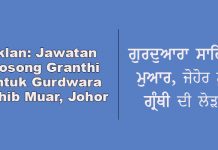
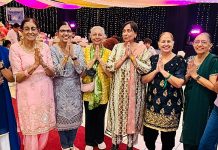





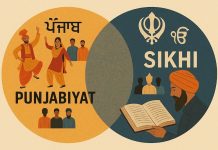

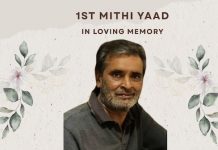
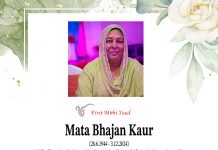








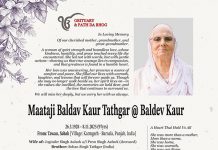










Manji Kaur’s interesting article is undoubtedly an amazing story of overcoming numerous obstacles stretching over many years. Hopefully this unique life story will inspire several young Punjabi/Sikh women to become successful TV presenters, journalists or professional counsellors.
“To be honest, I was living a double life, which resulted in lots of code-switching.” I just love that line. It’s the story for so many of us. Thanks for sharing. It’s brave of you to share.
Comments are closed.